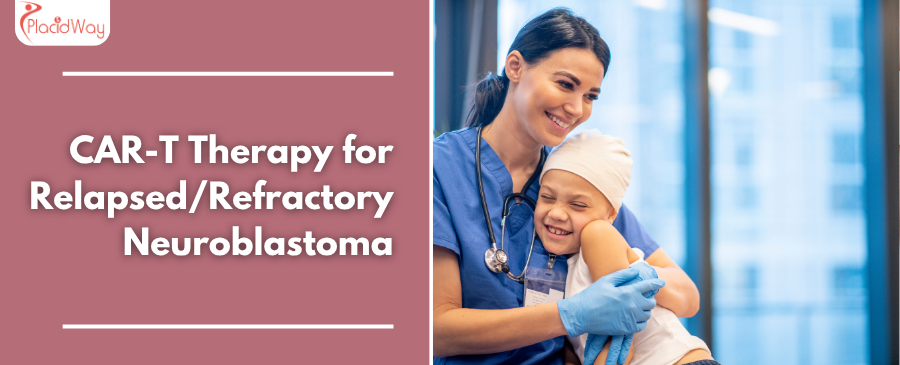
Finding New Hope: CAR-T Therapy for Relapsed/Refractory Neuroblastoma
The journey through a neuroblastoma diagnosis is incredibly challenging for families. When conventional treatments for neuroblastoma, a rare childhood cancer, are no longer effective, or if the disease returns—known as relapsed or refractory neuroblastoma—the search for advanced solutions becomes urgent. This is where CAR-T (Chimeric Antigen Receptor T-cell) therapy emerges as a beacon of hope, offering a groundbreaking, personalized approach for children battling this aggressive cancer.
Neuroblastoma originates from immature nerve cells and most commonly affects infants and young children. While initial treatments can be successful, a relapse means the cancer has returned, often with increased resistance, making it much harder to treat. Refractory neuroblastoma, on the other hand, means the cancer has not responded to previous therapies. These situations are devastating, pushing families to explore every possible avenue, including innovative immunotherapies like CAR-T therapy.
CAR-T therapy is a revolutionary type of cell-based gene therapy. It involves taking a patient's own immune cells (T-cells), modifying them in a lab to recognize and attack specific cancer cells, and then infusing them back into the patient. For neuroblastoma, researchers are developing CAR-T cells that target markers unique to neuroblastoma cells, such as GD2. Think of it like giving your child's immune system a super-charged GPS to find and destroy cancer cells. This highly targeted approach aims to provide a more potent and specific attack against the cancer, potentially leading to longer remissions and improved survival rates where other treatments have failed. For many, exploring this cutting-edge treatment means looking beyond borders to specialized centers worldwide.
What are the symptoms of relapsed or refractory neuroblastoma?
Recognizing the signs of relapsed or refractory neuroblastoma is crucial for timely intervention. While the initial symptoms might have led to the first diagnosis, recurrence can present differently depending on the sites affected. Families often search for "signs of neuroblastoma recurrence" or "how to tell if neuroblastoma is back." Common indicators can include:
- Persistent Bone Pain: If neuroblastoma returns in the bones, children may experience new or worsening pain, limping, or difficulty with movement.
- Unexplained Fevers and Fatigue: General malaise, lack of energy, and fevers without a clear cause can be a sign that the disease is active again.
- New Lumps or Swelling: Tumors might reappear in soft tissues, such as under the skin, in the abdomen, or around the eyes.
- Changes in Vision or Eye Movement: If the tumor affects areas near the eyes, parents might notice bruising around the eyes (raccoon eyes), proptosis (bulging eyes), or changes in how the child sees.
- Weight Loss or Loss of Appetite: A decline in overall health and a noticeable reduction in appetite can be concerning.
- Neurological Symptoms: Depending on the location, symptoms like weakness, numbness, or changes in balance can occur.
It's important for parents to maintain vigilance and communicate any new or persistent symptoms to their medical team promptly, as early detection of relapse is key to exploring new treatment avenues like CAR-T therapy.
What causes neuroblastoma and who is at risk?
Understanding the origins of neuroblastoma helps demystify this complex disease, even though a clear "cause" often remains elusive for individual cases. Many parents search for "what causes childhood cancer" or "risk factors for neuroblastoma."
- Neural Crest Cell Malformation: Neuroblastoma originates in neuroblasts, immature nerve cells that are part of the sympathetic nervous system, developing from neural crest cells. These cells are supposed to mature into various nerve tissues, but in neuroblastoma, they instead grow abnormally, forming a tumor. Most commonly, these tumors are found in the adrenal glands, which sit atop the kidneys, or in nerve tissues along the spine in the chest, abdomen, or pelvis.
- Genetic Mutations: While most cases are sporadic (meaning they occur randomly without a clear inherited pattern), genetic factors play a role in a small percentage (1-2%) of cases, known as familial neuroblastoma. Specific gene mutations, like those in the ALK gene or the presence of multiple copies of the N-MYC gene (known as N-MYC amplification), are often associated with more aggressive forms of the disease.
- Age is a Key Risk Factor: Neuroblastoma primarily affects infants and young children, with over 90% of diagnoses occurring before the age of five. It is extremely rare in adults.
It's important to emphasize that neuroblastoma is not caused by anything parents did or didn't do, nor is it linked to lifestyle factors. For most families, it’s an unfortunate and unpredictable genetic event that occurs during early development.
How does CAR-T therapy work for neuroblastoma, and what are other treatment options?
When families explore "neuroblastoma treatment options for relapse" or "what is CAR T cell therapy process," they're often looking for advanced, effective strategies. CAR-T therapy is truly at the forefront of personalized cancer treatment. Here’s a simplified breakdown of how it works:
- T-cell Collection (Apheresis): First, a small amount of the patient's blood is collected, similar to a blood donation. This process, called apheresis, separates and extracts the T-cells, which are a vital part of the immune system.
- Genetic Reprogramming: These T-cells are then sent to a specialized lab where they are genetically engineered. Scientists introduce a new gene, coding for a Chimeric Antigen Receptor (CAR), into the T-cells. For neuroblastoma, this CAR is designed to specifically recognize a protein called GD2, which is highly expressed on neuroblastoma cells. This gives the T-cells a "GPS" to find the cancer.
- Expansion and Multiplication: The newly modified CAR-T cells are then grown and multiplied in the lab to create millions of these cancer-fighting cells. This process can take several weeks.
- Preparation and Infusion: Before the CAR-T cells are infused back into the patient, a short course of chemotherapy may be given. This "lymphodepleting" chemotherapy helps to make space for the CAR-T cells in the patient's body and reduces the number of other immune cells that might compete with them. Finally, the CAR-T cells are infused back into the patient, much like a blood transfusion.
- Target and Destroy: Once inside the body, these re-engineered CAR-T cells act as an army, locating and aggressively attacking neuroblastoma cells wherever they are.
While CAR-T offers new hope, other treatments remain vital: Chemotherapy (powerful drugs), Radiation Therapy (high-energy beams), Surgery (to remove tumors), and conventional Immunotherapy (using drugs like Dinutuximab, which also targets GD2 but in a different way). For relapsed/refractory cases, CAR-T therapy is typically considered after these standard approaches have been exhausted or when specific trial eligibility is met.
Who is eligible for CAR-T therapy for relapsed/refractory neuroblastoma?
Determining eligibility for such a complex and experimental treatment is a rigorous process, and families often search for "CAR-T therapy criteria for kids" or "can my child get CAR-T for neuroblastoma?" Each clinical trial and treatment center will have specific requirements, but general considerations include:
- Diagnosis of Relapsed/Refractory Neuroblastoma: The primary requirement is that the neuroblastoma has either returned after prior treatment (relapsed) or has not responded to previous therapies (refractory).
- GD2 Expression: Most CAR-T therapies for neuroblastoma target the GD2 protein. Therefore, the patient's tumor cells must express sufficient levels of GD2 for the therapy to be effective. This is typically confirmed through biopsy.
- Overall Health and Performance Status: Patients must be well enough to undergo the procedure. This means having a good "performance status," indicating they are generally active and can tolerate the potential side effects. Severe organ dysfunction (heart, kidney, liver, lung) may exclude a patient.
- Absence of Active Infections: Patients should not have active, uncontrolled infections, as CAR-T therapy can temporarily weaken the immune system.
- No Active Brain Metastases: Some protocols may exclude patients with active cancer in the brain or central nervous system, though this can vary by trial.
- Prior Treatment History: There might be specific requirements regarding the number and type of previous treatments, as well as a waiting period after the last therapy.
- Age: While neuroblastoma primarily affects children, CAR-T trials typically specify age ranges.
A comprehensive evaluation by a multidisciplinary team is essential to determine if a child is a suitable candidate for CAR-T therapy, weighing the potential benefits against the risks.
What is the expected recovery time and what can families anticipate after CAR-T infusion?
The period following CAR-T cell infusion is a critical phase requiring close observation and management. Families often ask "what to expect after CAR-T infusion for neuroblastoma" or "CAR-T therapy recovery timeline."
- Initial Hospitalization (Weeks): Patients are typically hospitalized for 2-4 weeks after infusion. This is the period when severe side effects, like Cytokine Release Syndrome (CRS) and neurotoxicity, are most likely to occur and require immediate management. During this time, the child's vital signs, neurological status, and blood counts are constantly monitored.
- Acute Side Effects Management: Medical teams are on alert for symptoms such as high fever, low blood pressure, difficulty breathing (CRS), or confusion, seizures, and speech difficulties (neurotoxicity). Medications like tocilizumab are used to manage CRS.
- Outpatient Monitoring (Months): After discharge, close outpatient follow-up is essential, often for several months. This includes frequent clinic visits for blood tests, imaging scans, and assessments of overall health. Children may need to stay near the treatment center during this period.
- Immunosuppression and Infection Risk: CAR-T therapy can lead to prolonged low blood counts and B-cell aplasia (low levels of B-cells, another type of immune cell), increasing the risk of infection. Patients may receive intravenous immunoglobulin (IVIG) infusions to bolster their immunity and prophylactic antibiotics.
- Return to Normalcy: While some children bounce back relatively quickly, others may experience prolonged fatigue and require time to regain strength. The return to school and normal activities is gradual and determined by the medical team based on the child's recovery and immune status. Long-term follow-up (years) is standard to monitor for potential late effects and recurrence.
What are the potential risks and side effects of CAR-T therapy for neuroblastoma?
While CAR-T therapy offers incredible promise, it's not without significant risks, which is why it's performed in highly specialized centers. Parents researching "CAR-T therapy side effects in children" or "what are the dangers of CAR-T therapy" need a clear understanding.
- Cytokine Release Syndrome (CRS): This is the most common severe side effect, occurring when the activated CAR-T cells release a large number of inflammatory proteins called cytokines. Symptoms can range from mild (fever, fatigue, muscle aches) to severe and life-threatening (high fever, low blood pressure, difficulty breathing, organ dysfunction). CRS typically occurs within the first few days to two weeks after infusion.
- Immune Effector Cell-Associated Neurotoxicity Syndrome (ICANS): Neurotoxicity, or ICANS, is another serious side effect affecting the brain and nervous system. Symptoms can include headache, confusion, difficulty speaking (aphasia), tremors, seizures, or even brain swelling. Like CRS, ICANS usually occurs within the first few weeks post-infusion.
- B-cell Aplasia and Hypogammaglobulinemia: Because some CAR-T therapies also target B-cells (another type of immune cell), they can destroy healthy B-cells along with cancer cells. This can lead to a weakened immune system (hypogammaglobulinemia) and increased risk of infection, sometimes requiring regular immunoglobulin infusions (IVIG).
- Low Blood Counts (Cytopenias): The lymphodepleting chemotherapy before CAR-T infusion, along with the CAR-T cells themselves, can cause prolonged low levels of red blood cells, white blood cells, and platelets, leading to anemia, infection risk, and bleeding issues.
- Infection: Due to a weakened immune system, patients are at higher risk of bacterial, viral, or fungal infections, particularly in the months following treatment.
- On-target, Off-tumor Effects: In some cases, the CAR-T cells might inadvertently target healthy cells that also express the target antigen (like GD2), leading to unintended damage to healthy tissues.
These side effects highlight the need for CAR-T therapy to be administered and managed by experienced medical teams in facilities equipped for intensive care and specialized oncology.
How much does CAR-T therapy for neuroblastoma cost worldwide?
The financial burden of CAR-T therapy is a major concern for families, leading many to search for "CAR-T therapy cost abroad" or "affordable CAR-T for neuroblastoma." The price tag reflects the complexity of the personalized manufacturing process, specialized medical care, and extensive monitoring required.
It's important to note that costs can vary significantly:
- Research vs. Approved Therapies: For neuroblastoma, CAR-T therapy is still largely within clinical trial settings or compassionate use programs. The cost structure for these can differ from commercially approved CAR-T products (which exist for other cancers like certain leukemias and lymphomas).
- All-Inclusive vs. Itemized: Some centers or medical tourism facilitators may offer "all-inclusive" packages, while others itemize every service, including apheresis, cell manufacturing, hospital stay, medications, and follow-up care.
- Duration of Hospital Stay: Complications requiring extended ICU stays can significantly increase the total cost.
- Insurance Coverage: While some insurance plans may cover CAR-T for approved indications, coverage for neuroblastoma (often off-label or in trials) can be limited or nonexistent, especially when seeking treatment abroad.
| Country/Region | Estimated Cost (USD) | Notes |
|---|---|---|
| USA | $800,000 - $1,500,000+ | Often includes access to pioneering trials and leading academic centers; highest costs overall. |
| Western Europe (e.g., Germany) | $500,000 - $1,000,000 | High quality of care and advanced facilities, often with robust clinical trial programs. |
| Asia (e.g., South Korea, Singapore) | $300,000 - $700,000 | Emerging hubs for medical tourism with state-of-the-art facilities and competitive pricing for advanced therapies. |
| India / Thailand | $250,000 - $600,000 | Potentially more affordable options, but thorough vetting of facility accreditation and expertise for this highly specialized procedure is crucial. |
Note: These are estimated costs and can vary significantly based on specific protocol, clinic, patient's individual needs, length of stay, and pre/post-treatment care. Always obtain a detailed quote from your chosen provider.
Why should families consider CAR-T therapy for neuroblastoma abroad?
For parents facing the challenge of relapsed/refractory neuroblastoma, exploring "CAR-T therapy international options" or "medical travel for pediatric cancer" can open doors to new possibilities:
- Access to Specific Clinical Trials: CAR-T therapy for neuroblastoma is still largely in the research phase. Different countries and institutions conduct unique clinical trials with varying eligibility criteria and targeted antigens. Traveling abroad may provide access to a specific trial that isn't available or hasn't opened in one's home country.
- Cost Savings: As seen in the cost comparison, the price of CAR-T therapy can differ drastically across countries. For families without adequate insurance coverage or facing prohibitive costs domestically, seeking treatment abroad can offer a more affordable path to life-saving care.
- Shorter Wait Times: In some countries, the demand for highly specialized treatments can lead to long wait lists. Traveling internationally might provide quicker access to therapy, which can be critical for aggressive cancers like neuroblastoma.
- Specialized Expertise and Technology: Certain global centers are renowned for their expertise in pediatric oncology and advanced cell therapies. They may have specific experience with neuroblastoma CAR-T protocols or possess state-of-the-art facilities and research capabilities.
- Second Opinions and Comprehensive Care: Medical travel allows families to seek second opinions from leading experts worldwide, ensuring all potential avenues are explored. Many international clinics also offer comprehensive support for medical tourists, including language services, accommodation assistance, and travel coordination.
Which countries offer the best value and expertise for CAR-T therapy for neuroblastoma?
When searching for "best hospitals for CAR-T therapy abroad" or "leading CAR-T centers worldwide," several nations consistently stand out due to their advanced medical infrastructure, research capabilities, and commitment to innovative cancer treatments:
- United States: Home to many of the world's leading research hospitals and academic medical centers (e.g., Children's Hospital of Philadelphia, Memorial Sloan Kettering Cancer Center, St. Jude Children's Research Hospital). The U.S. often leads in the development and implementation of cutting-edge CAR-T trials, though at a higher cost.
- Germany: Renowned for its rigorous medical standards and robust healthcare system, Germany offers several excellent centers with strong pediatric oncology programs and CAR-T expertise. They often participate in international clinical trials and are a popular destination for medical tourism due to their quality and slightly lower costs than the U.S.
- South Korea: A rising star in medical tourism, South Korea boasts state-of-the-art hospitals and a strong focus on advanced therapies, including CAR-T. Cities like Seoul have world-class medical facilities that combine advanced technology with competitive pricing and comprehensive international patient services.
- Singapore: Known for its high standards of medical care and technological innovation, Singapore offers sophisticated cancer treatment centers. While costs can be moderate to high, the quality of care and patient experience are exceptional.
- United Kingdom: Academic centers in the UK also have active CAR-T programs, particularly for pediatric cancers, and are involved in ongoing research.
When evaluating options, families should look for centers with established pediatric oncology departments, active participation in CAR-T clinical trials for neuroblastoma, proven expertise in managing CAR-T side effects, and comprehensive support services for international patients.
What to expect when traveling for CAR-T therapy for neuroblastoma?
Undertaking international travel for CAR-T therapy is a significant commitment. Families often search for "how to travel for CAR-T therapy" or "medical tourism tips for pediatric cancer." Here's what to anticipate:
- Extensive Planning and Documentation: This includes translating all medical records, obtaining multiple medical opinions, securing necessary visas for the patient and caregivers, and arranging accommodation for an extended period (potentially 3-6 months or longer, including initial assessment, treatment, and critical post-infusion monitoring).
- Initial Consultations and Evaluation: The process typically begins with remote consultations, where medical records are reviewed. If the patient is deemed a potential candidate, an initial in-person visit for a thorough evaluation (tests, scans, biopsies) will be necessary.
- Logistical Support: Many international hospitals and medical tourism facilitators offer dedicated teams to assist with travel logistics, including airport transfers, accommodation near the hospital, interpreter services, and help with local navigation.
- Financial Management: Be prepared for upfront payments or significant deposits. Understand what the quoted cost includes (treatment, hospital stay, medications, follow-up, and potential complications) and what it doesn't (travel, accommodation, living expenses, food).
- Emotional and Practical Support: Traveling away from home for such a high-stakes treatment can be emotionally taxing. Seek out support networks, both from the medical facility and from other families who have undertaken similar journeys. Ensure you have access to funds for unforeseen expenses.
- Post-Treatment Care: Understand the plan for post-discharge care and follow-up once you return home. Some centers may require initial follow-up to be done locally before returning to your home country.
How to ensure safety and quality abroad for CAR-T therapy?
Ensuring the highest standards of safety and quality for CAR-T therapy abroad is paramount for families. Concerns often arise around "safe CAR-T therapy clinics overseas" or "how to choose a foreign hospital for cancer." Here are key steps:
- Accreditation and Certification: Look for hospitals with international accreditations such as Joint Commission International (JCI). This signifies adherence to rigorous patient safety and quality-of-care standards.
- Physician Expertise and Team Experience: Research the credentials and experience of the medical team, especially the pediatric oncologists and cellular therapy specialists. Inquire about their specific experience with CAR-T therapy for neuroblastoma and their success rates.
- Facility Capabilities: Ensure the hospital has dedicated facilities for CAR-T therapy, including an apheresis unit, a cell processing lab (often outsourced to a partner), and an intensive care unit (ICU) equipped to manage severe CAR-T related side effects (CRS, neurotoxicity).
- Regulatory Approval and Clinical Trial Status: Verify that the CAR-T therapy is offered either as part of an approved clinical trial (with proper ethical oversight) or under a specific regulatory framework for compassionate use. Avoid unproven or "experimental" treatments offered outside of established clinical research.
- Patient Testimonials and References: Seek out genuine testimonials or connect with other families who have undergone CAR-T therapy at the institution. Reputable facilitators can sometimes help with this.
- Reputable Medical Tourism Facilitators: Consider working with established medical tourism companies like PlacidWay. They often have partnerships with accredited hospitals, understand the complexities of international medical travel, and can help vet providers and streamline the process.
- Transparency in Pricing and Protocols: Demand clear, itemized cost breakdowns and a detailed treatment plan, including potential contingencies for complications.
What are patient success stories and outcomes for CAR-T therapy in neuroblastoma?
For families researching "CAR-T therapy success rates kids neuroblastoma" or "does CAR-T work for neuroblastoma," it's important to frame expectations within the context of ongoing research. Unlike some leukemias where CAR-T is an approved standard treatment, for relapsed/refractory neuroblastoma, it remains a pioneering field.
- Promising Early Results: Early clinical trials for GD2-targeted CAR-T therapy in neuroblastoma have shown encouraging results. Some studies have reported objective response rates (tumor shrinkage or disappearance) in a significant percentage of patients who had exhausted all other treatment options. These are often children with very aggressive disease and a poor prognosis.
- Achieving Remission: For some children, CAR-T therapy has led to durable remissions, extending their lives and improving their quality of life. These "success stories" represent a profound breakthrough in cases where there was previously little hope.
- Continued Research and Refinement: Researchers are continually working to improve CAR-T therapy for neuroblastoma by optimizing target selection, enhancing CAR-T cell persistence, and minimizing side effects. This means that future generations of CAR-T cells may offer even better outcomes.
- Focus on Quality of Life: Beyond survival rates, CAR-T therapy also aims to provide a better quality of life compared to conventional intensive treatments. For children who achieve remission, the goal is to return to as normal a life as possible.
While not every child responds to CAR-T therapy, the potential for life-changing outcomes for this challenging cancer makes it a beacon of hope and a critical area of ongoing medical innovation. Each successful case fuels further research, bringing us closer to more effective treatments for all children with neuroblastoma.
Take the Next Step with PlacidWay
Ready to explore treatment options abroad? Discover top clinics, compare prices, and get a free quote tailored to your needs with PlacidWay.
CAR-T Cell Therapy | Chimeric Antigen Receptor T-Cell

-Package-in-Kuala-Lumpur,-Malaysia-by-FirstCell.jpg)








Share this listing